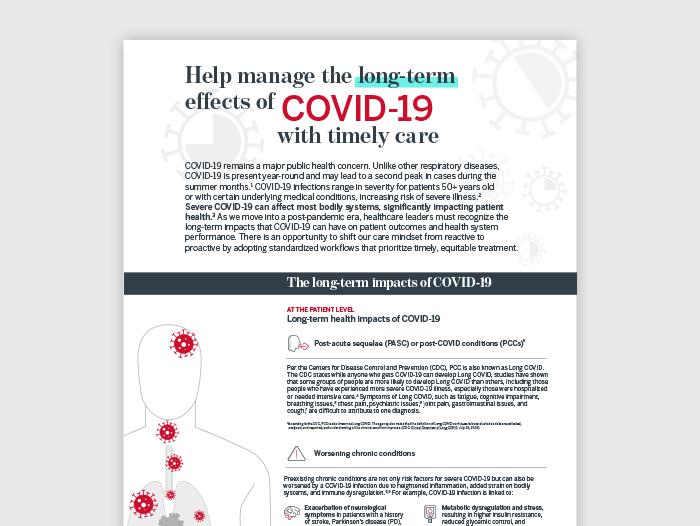Auto logout in seconds.
Continue LogoutResearch has found that many patients at high risk of severe COVID-19 are still not prescribed the antiviral treatment Paxlovid, or any other antiviral treatment, often due to misconceptions about the drug.
Paxlovid is being under-prescribed
An observational study from researchers at the Harvard T.H. Chan School of Public Health published in JAMA Health Forum found that patients on Medicare who were at the highest risk of severe COVID-19 were less likely to receive outpatient antiviral treatments than Medicare beneficiaries who were lower risk.
When researchers performed a simulation analysis of the data, they determined that reallocating Paxlovid according to a patient's risk could have prevented 10,300 hospitalizations and 16,500 deaths in 2022.
In another study published in CDC's Morbidity and Mortality Weekly Report, researchers found that 80% of immunosuppressed patients with mild-to-moderate COVID-19 weren't offered any form of antiviral medication, despite being at high risk for severe disease.
Why aren't doctors prescribing antivirals?
Experts say there are a variety of reasons doctors are hesitant to prescribe Paxlovid.
In the CDC study, nearly half of the patients weren't prescribed an antiviral because they had "mild symptoms," while around one in five weren't prescribed the treatment because more than five days had passed since the onset of their symptoms. Meanwhile, 5.7% weren't prescribed an antiviral because of potential contraindications, and 20% were offered an antiviral but refused the treatment.
According to Paul Monach, head of the rheumatology section at the Veterans Affairs Boston Healthcare System and lead author on the study, people with mild symptoms are "exactly the target group for getting the treatment."
"Every case starts off mild," and it's impossible to know when it will become more severe, said Davey Smith, an infectious disease specialist at UC San Diego. "It might not be until the fifth or sixth day that you get into trouble — and by that time it's too late to take these medications."
Smith said he was especially concerned that immunosuppressed patients weren't getting prescribed antivirals. "Those are the people who are still coming into our hospital. And those are the ones who are dying. ... It breaks my heart every time I see them in the hospital, and they just didn't get the medication," he said.
Other doctors are hesitant to prescribe antivirals out of concern for what's called "Paxlovid rebound," where people who take the drug develop COVID-19 symptoms again around two to eight days after they recover.
However, researchers at FDA found in a study that COVID-19 "rebound can occur with or without [Paxlovid] treatment. Viral RNA rebound was not restricted to [Paxlovid] recipients, and rebound rates were generally similar to those in placebo recipients."
According to Peter Chin-Hong, an infectious disease expert at UC San Francisco, most people don't experience a COVID-19 rebound. And although a rebound can occur, that shouldn't dissuade people "who might really need it" from taking an antiviral.
Even if rebound does occur, symptoms "tend to be mild and do not require repeating the treatment," according to the California Department of Public Health.
Experts also say some doctors are hesitant to prescribe antivirals because of the risk of serious side effects. However, the California Department of Public Health noted that "most people have little-to-no side effects." The most common side effects for Paxlovid are developing a metallic taste in the mouth, which happens in around 6% of people, and diarrhea, which occurs in around 3% of people.
"At the end of the day, having some potentially unpleasant side effects that some people report — maybe like stomach upset or metallic taste — is far better than going to the hospital because of COVID," said Richard Dang, an assistant professor of clinical pharmacy at the University of Southern California.
Michael Barnett, co-author of the Harvard study, also noted that under-prescribing could be due to a lack of education.
"I worry that a lot of the difference in Paxlovid [uptake] is that there's a large education and awareness gap where a lot of people don't know what Paxlovid is or are skeptical of it," he said, adding that in his experience, most of the patients who ask for Paxlovid are well-educated and white.
Medical misinformation, the politicization of COVID-19, and distrust in the medical and pharmaceutical industries have also likely contributed to low uptake of Paxlovid, according to Suraj Saggar, chief of infectious diseases at Holy Name Medical Center.
However, Saggar noted that not every patient who requests Paxlovid is at high risk for severe COVID-19. "I spend a significant amount of time telling people why they don't need it as well as telling people why they do," he said. "It's become harder as this pandemic has evolved, where it's not a one-size-fits-all." (Lin, Los Angeles Times, 1/29; Kahn/Clark, MedPage Today, 1/29; Reyes, Los Angeles Times, 1/25)
Use our resource library to learn how health plans can manage the impact of COVID-19 and what to prepare for next.
Don't miss out on the latest Advisory Board insights
Create your free account to access 1 resource, including the latest research and webinars.
Want access without creating an account?
You have 1 free members-only resource remaining this month.
1 free members-only resources remaining
1 free members-only resources remaining
You've reached your limit of free insights
Become a member to access all of Advisory Board's resources, events, and experts
Never miss out on the latest innovative health care content tailored to you.
Benefits include:
You've reached your limit of free insights
Become a member to access all of Advisory Board's resources, events, and experts
Never miss out on the latest innovative health care content tailored to you.
Benefits include:
This content is available through your Curated Research partnership with Advisory Board. Click on ‘view this resource’ to read the full piece
Email ask@advisory.com to learn more
Click on ‘Become a Member’ to learn about the benefits of a Full-Access partnership with Advisory Board
Never miss out on the latest innovative health care content tailored to you.
Benefits Include:
This is for members only. Learn more.
Click on ‘Become a Member’ to learn about the benefits of a Full-Access partnership with Advisory Board
Never miss out on the latest innovative health care content tailored to you.


